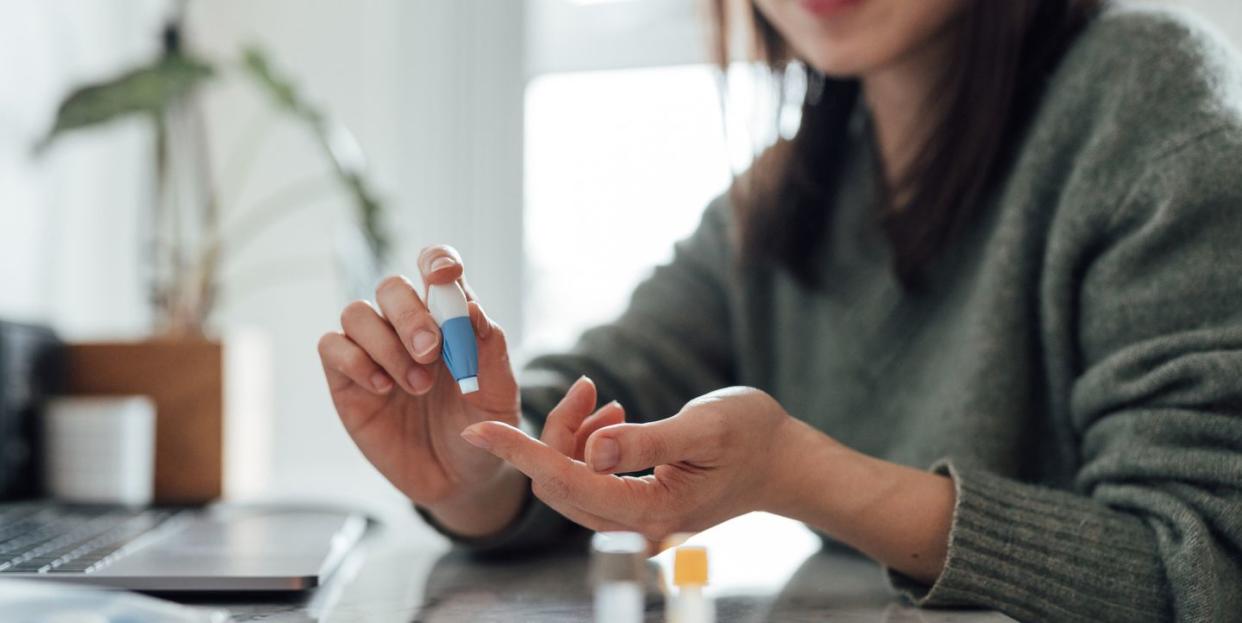CDC Study Suggests People With Diabetes Have a Higher Risk of Dying From COVID-19

People with diabetes have been considered high risk for severe illness from COVID-19 practically since the pandemic began. But research has increasingly shown just how serious the virus can be for diabetics.
An analysis by the Centers for Disease Control and Prevention (CDC) of data from 10,647 people who died from COVID-19 between February and May 2020 found that 40% had diabetes. Another study published in BMJ Open analyzed data from 1.3 million COVID patients and found that having diabetes increased the risk of death by 14%.
Research has also linked diabetes with the development of more severe COVID-19 and a person’s risk of being put on a ventilator if they contract the virus.
More than 37 million Americans (or 11.3% of the population) have diabetes, according to the CDC, and 96 million adults have prediabetes, a condition that can be a precursor to diabetes. Meaning, there are a lot of people at risk for severe COVID based on their diabetes status alone.
Here’s why there’s a link and how to stay safe if you’re at risk.
Why is coronavirus dangerous for diabetics?
Researchers are still trying to untangle what it is, exactly, about diabetes that raises a person’s risk of developing severe COVID. However, diabetics in general are more prone to developing infections, says William Schaffner, M.D., an infectious disease specialist and professor at the Vanderbilt University School of Medicine. “This is true all the way from urinary tract infections to pneumonia to influenza,” he says. “The entire metabolic circumstance of diabetes impedes a patient’s ability in a variety of ways to fend off attacking viruses and bacteria.”
People with diabetes, especially type 2 diabetes, are also more likely to have obesity, which is an independent risk factor for severe COVID, points out Thomas Russo, M.D., professor and chief of infectious disease at the University at Buffalo in New York.
Are people with type 1 diabetes at an increased risk of severe COVID, too?
Unfortunately, yes. “People with both forms of diabetes have been shown to be at risk,” Dr. Russo says. The CDC specifically notes on its website that “having either type 1 or type 2 diabetes can make you more likely to get very sick from COVID-19.”
Is high blood sugar associated with worse outcomes in COVID-19 patients?
Having high blood sugar is typically one sign that a person’s diabetes isn’t under control—and that’s a risk factor for severe COVID. “There is data that shows that the more severe the diabetes, the more likely you will develop severe illness if you happen to get infected with COVID-19,” Dr. Schaffner says. “The degree of diabetes control undoubtedly plays a role.”
Dr. Russo agrees. “We generally believe that, if you’re a poorly controlled diabetic, you’re less likely to have optimal response to infections,” he says.
Can COVID-19 increase blood sugar in diabetics?
Yes, COVID-19 can increase blood sugar in diabetics. “In general, if you get any infection—COVID included—it will throw your diabetes control out of whack and your blood sugar will rise,” Dr. Schaffner says.
This, Dr. Russo says, makes it doubly important for people with diabetes to control their condition and blood sugar as best as possible. “That may help minimize the consequences if they get infected,” he says.
Who is at higher risk of developing serious illness from COVID-19?
The CDC has a list of health conditions that raise a person’s risk of developing severe COVID. Those health conditions include:
Cancer
Chronic kidney disease
Diabetes
Chronic lung disease
Heart conditions
Being immunocompromised
Having overweight or obese
Pregnancy
Having an organ transplant
What can you do to stay safe?
There are a few different things people with diabetes can do to protect themselves from severe COVID-19. Making sure that you’re “vaxxed to the max” is crucial, Dr. Russo says. That means getting your fully recommended COVID-19 vaccine regimen, including a booster shot when you’re eligible, he says.
“You also want to really rigorously adhere to your diabetes control regimen,” Dr. Schaffner says. “Eat well, do modest exercise, get good sleep, and take your medication. All of that is important.”
If COVID-19 infections are increasing in your area, Dr. Russo suggests wearing a “high-quality, well-fitted mask” (such as KN95 or N95 masks) indoors in areas where you’re at a higher risk of being exposed to COVID-19, like the grocery store. “Vaccines aren’t perfect,” he says. “Masks can help bridge that gap.”
You Might Also Like

